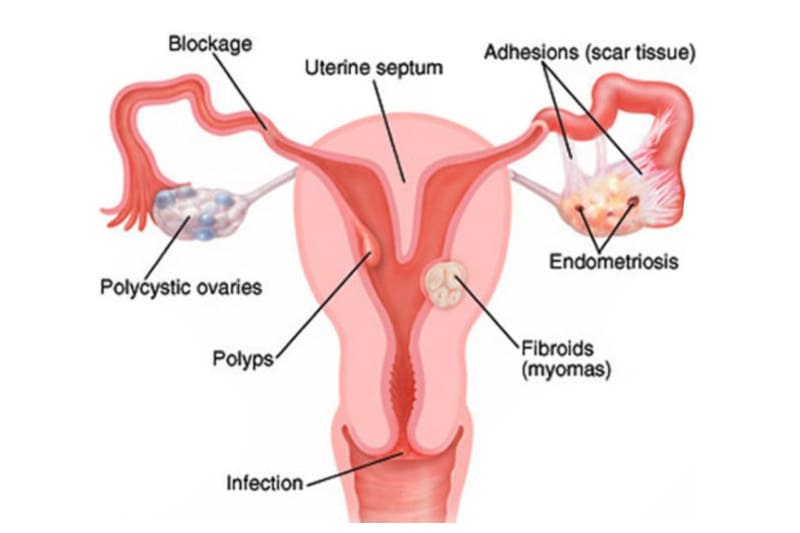Recurrent Pregnancy Loss
Recurrent pregnancy loss (RPL) is classically defined as the occurrence of three or more consecutive pregnancy losses. A pregnancy loss is defined as a clinically-recognized pregnancy involuntarily ending before 26 weeks.
A clinically-recognized pregnancy means that the pregnancy has been visualized on an ultrasound or that pregnancy tissue was identified after a pregnancy loss.
The basic workup of RPL is typically started after experiencing three consecutive losses in the first trimester unless there are other identifiable causes for the miscarriages.
If you have recurrent miscarriages, you should know that the Fertility Specialist in Nairobi at Footsteps To Fertility Centre in Kenya understands the emotional toll of pregnancy loss. The team is dedicated to supporting you through the challenges, finding the cause, and helping you have a healthy baby.
What Causes Recurrent Pregnancy Loss?
Most miscarriages occur due to abnormal genes or chromosomes that stop the fetus from normal growth and development. It’s important to know that these abnormal genes do not come from an inherited health condition.
About half of all miscarriages are associated with extra or missing chromosomes that happen by chance during fertilization. One common chromosomal cause, called translocation, occurs when separate chromosomes swap small segments, creating an abnormal area on each chromosome.

nezhat.org. Image source: Infertility determining a diagnosis. Accessed via https://nezhat.org/treatment-of-infertility/infertility-determining-a-diagnosis/
A variety of other conditions may cause repeated miscarriages. Abnormalities in the uterus — congenital problems that affect the structure of the uterus, uterine fibroids, polyps, and adhesions — are all associated with miscarriage.
Medical conditions can also increase the risk of miscarriage. Diabetes, polycystic ovary syndrome, hypothyroidism, and an autoimmune disorder called antiphospholipid syndrome represent some of the top medical causes.
In some cases, problems with the blood supply in the placenta lead to recurrent miscarriages.

How is recurrent pregnancy loss diagnosed?
A general, physical examination should be performed on the patient, with any signs or symptoms related to endocrine and/or gynecologic abnormalities thoroughly documented and investigated.
Your specialist should obtain pertinent gynecologic history regarding previous pregnancies that were viable, history of uterine surgeries, history of irregular menstrual cycles, history of medical illnesses/endocrine abnormalities, and/or non-gynecologic surgeries.
Tests include:
- Karyotype blood testing of couples is done to rule out chromosomal abnormalities.
- Uterine evaluation to rule out anatomic abnormalities, either congenital or acquired, leading to RPL can be accomplished utilizing a hysterosalpingogram (HSG), Sonohysterogram (SHG), 3-D ultrasonography, or magnetic resonance imaging (MRI). At this time HSG and SHG represent the most cost-effective, simplest, and most accurate diagnostic testing.
- Blood testing: evaluation of thyroid function with a serum TSH level, evaluation of ovarian reserve utilizing a serum AMH level, and elimination of possible immunologic factors utilizing anticardiolipin antibodies and lupus anticoagulant.
- Screening for diabetes mellitus should be reserved for those women with clinical manifestations of the disease.
- Screening for infectious diseases such as toxoplasmosis brucella, CMV, syphilis and HIV and others.
Treatment of Recurrent Pregnancy Loss
The treatment of recurrent pregnancy loss is based upon clinical, radiologic, and laboratory findings. Couples in which one of the partners carries a chromosomal rearrangement or abnormality should be referred for genetic counseling to discuss the probability of viable pregnancy based on the chromosomes involved.
Women with a uterine septum, intrauterine adhesions, and uterine fibroids (especially submucosal fibroids) can choose surgical correction, which has been shown to be associated with a reduced risk of miscarriage.
If you have experienced more than one miscarriage, a second-trimester miscarriage, or a stillbirth, we understand that you may have concerns about your next pregnancy.
At Footsteps to Fertility Centre in Nairobi, Kenya, our team of reproductive endocrinologists and experts in ultrasound diagnosis work together to determine the cause of a previous miscarriage or stillbirth.
Our team also develops a care plan that can increase the odds of a successful pregnancy.
Book Your
Appointment today!
Make an Appointment


